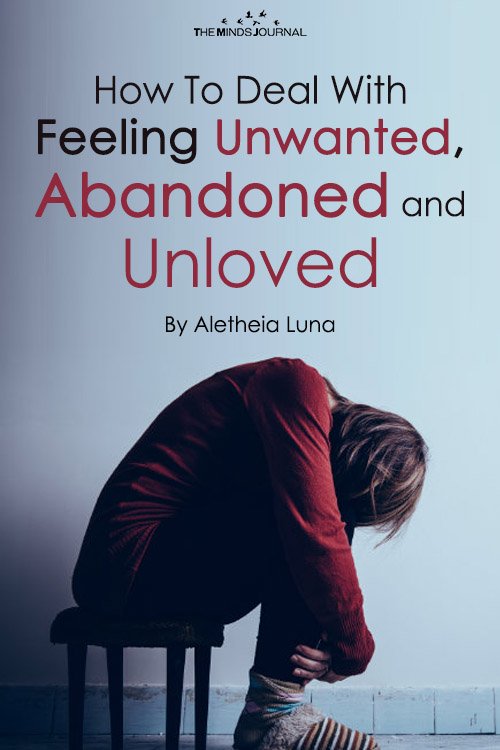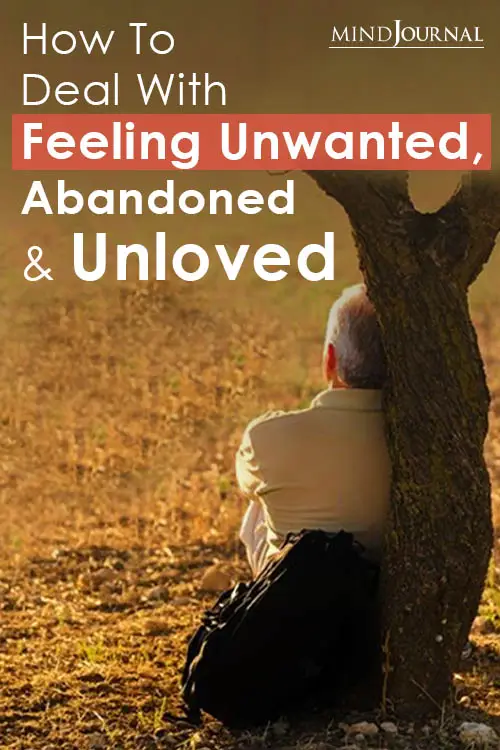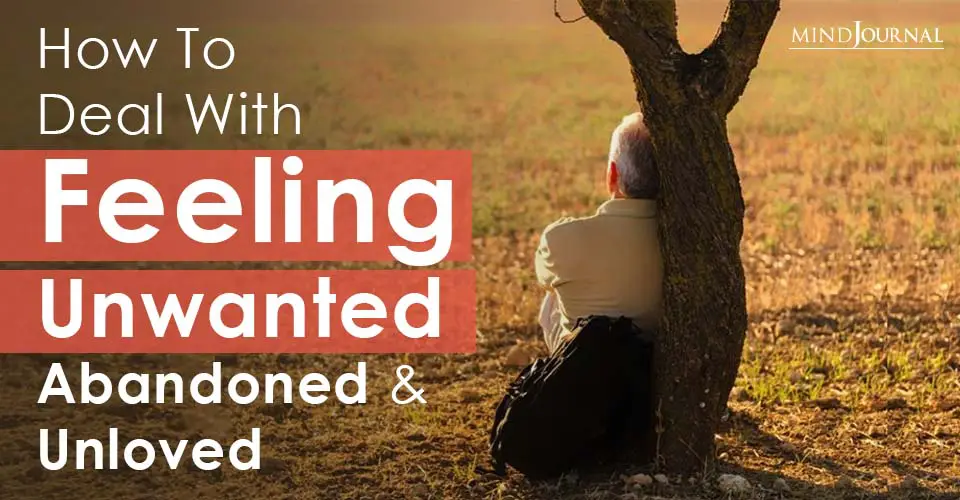Are you feeling unwanted and unloved? Unable to cope up with the feeling of abandoned?
You feel a sense of anger and deep pain rippling through you. How could they leave you so brutally, and without a second thought?
How could they take your love and trust, and throw it to the wind as if it didn’t even matter – as if YOU didn’t matter?
If you’ve experienced abandonment in your life before you will know how far the wounds of being “second best” or “not worth it” run within you. You will be very aware of how feeling unwanted has changed the person you are and the way you interact with others.
Related: The Real Cause of Inner Emptiness and What To Do About It
One thing I’ve learned on my path is that abandonment takes many different shapes and forms. Feeling unwanted and unloved can manifest itself physically, emotionally, psychologically, and even spiritually. But the one thing that all of these different facets of being neglected have in common is the big gaping hole they leave in our lives.
Today I want to explore that void within you.
“I AM NOT WORTH IT” MIGHT BE YOUR CORE WOUND
When we experience a severe form of abandonment or neglect, particularly at a young age, the shock from that experience tends to stay with us for the rest of our lives. But these shocking experiences continue to dwell within us only if we fail to explore them. These experiences when left unexamined for too long become our core wounds or the deepest fundamental beliefs that we have about ourselves on an unconscious level.
Related: Existential Depression, Sensitivity and Soul Loss
As Sol wrote in his article “How to Discover Your Deepest, Darkest Core Wound”:
Our core wounds are our deepest seated pains in life. They are our oldest and most miserable friends. For most of us, these core wounds within us are ruled by the following two mistaken beliefs:
“I am flawed and therefore a bad person.”
“I must change or fix something about myself in order to be acceptable.”
Other common core wounds that arise as a product of feeling unwanted include, “I am not worth it,” “I am unlovable,” and “I am irreparably broken.”
4 WAYS TO DEAL WITH FEELING UNWANTED AND UNLOVED
We have found ourselves in a period of time that I like to call the Individualist Era. As our ability to communicate empathetically and meaningfully with others breaks down as a result of our “ME FIRST!” corporate and materialist culture, we find that our families, friendships, and relationships are as unstable as ever. Therefore, more and more of us are experiencing the isolation of being abandoned, cheated, and forgotten and feeling unwanted.
What can we do to explore and heal these core wounds? How can we tear down the brick walls that shelter the tattered remnants of our hearts? And finally, how can we become stronger, more whole people again?
Like you, I have experienced abandonment in many different shapes and forms. Like you, I have suffered terribly as a result of it. But today I want to provide you with something proactive, something that will empower you to take your life in your own hands again.
This is what I have personally learned about facing the pain of feeling unwanted:
1. MOST PEOPLE DON’T WANT THEMSELVES.
In other words, most people don’t LIKE, respect, or even value themselves. There is a huge self-love deficit in our society which is reflected in every layer of our lives. As a result, those of us who struggle with loving ourselves tend to sabotage our relationships with others. How can a person who doesn’t know how to love themselves show love towards others? It doesn’t happen. Understanding this can help you to better empathize with others, or at the very least, comprehend why they behave the way they do.
Related: 12 Tips To Self-Love And Compassion
If you are feeling unwanted, watch this video to know the secret to being enough:
2. YOU ARE A VICTIM OF CIRCUMSTANCE, BUT YOU DON’T HAVE TO PITY YOURSELF.
I discovered this the hard way: the more you victimize yourself and romanticize your pain, the more you will stay stuck in cycles of misery and resentment. It’s tempting to use our stories of abandonment and mistreatment to make us secretly feel righteous and special, but the truth is that this does more harm than good. Mourning what we lost is a natural part of the grief cycle, but constantly revisiting and dwelling on our stories is unhealthy and even self-destructive. I’ve found that accepting what happened is vital to the process of inner growth and transformation, WITHOUT self-pity.
Related: 11 Things People With Anxiety Want You To Know
3. EVERYONE HAS A DIFFERENT SOULFUL CAPACITY.
Just as everything in life goes through various stages of maturation, so too does the soul. Why is it that some people are born with old souls, and others remain young at heart until death? I believe the answer lies in something I call soulful maturity. I explore this concept more in-depth in my book. Soulful maturity determines how much capacity we have for forethought, compassion, empathy, and unconditional love – and these factors all have an impact on the way we treat others. For example, some people are naturally pack-orientated and blinded by fear of the “other,” while other groups of people are open, accepting, and peace-making.
So what does any of this have to do with feeling unwanted and abandoned? Well, the point is that some people just don’t have the capacity to be genuinely kind, considerate and faithful – at least for now. They haven’t reached that point in their soulful maturing yet. Thus their behavior can come across as insensitive, reckless, and even cruel.
Understanding that everyone has a different soulful capacity has helped me to personally become a more lenient and forgiving person.
4. IT IS POSSIBLE TO FILL THAT EMPTY HOLE YOURSELF.
It sounds crazy, right? How can we fill the empty holes within ourselves? Don’t we need other people by default to do that for us? No, we don’t. As children we did, but as adults, we don’t. Unfortunately, many of us still carry the unconscious belief that we need to find another person to help us become whole and complete. But have you ever questioned the validity or truth in this belief? Don’t get me wrong, other people can provide you with immense support and assistance, but they can never authentically fill that void within you. Only you can.
Related: How Children Of Obsessed Parents End Up Feeling Lost and Empty
But how? One of the best ways I have learned to do this (particularly if you were abandoned as a child emotionally, mentally or physically), is by learning how to re-parent your inner child. I explore how to do that in this article. However, if you are dealing with the pain of feeling unloved as an adult (perhaps as a result of divorce or breakup), self-love is the ultimate way to overcome this trauma. I explore how to love yourself in this article.
FINAL THOUGHTS …
Learning how to love yourself is hard – so is learning how to re-parent your inner child – however, they are both vital tools that will help you to become vulnerable again, and therefore receptive to giving and receiving love.
What is your opinion on the advice given in this article? Have you managed to deal with your feelings of being unwanted, and if so, how?
Written by Aletheia Luna
Article originally appeared on LonerWolf










Leave a Reply
You must be logged in to post a comment.